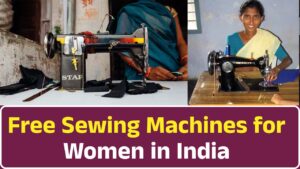Free Sewing Machines for Women in India
The Free Sewing Machine Scheme is a government initiative aimed at empowering economically weaker women, especially in rural areas, by providing them with free sewing machines. This enables them to earn a livelihood through tailoring and stitching work from home.

Objectives
- Promote self-employment and financial independence for women
- Empower rural and underprivileged women
- Reduce urban migration by creating local income opportunities
- Align with Atmanirbhar Bharat and women entrepreneurship goals
Scheme Overview
- Implemented by Central Government and various State Governments
- Targets women aged 20 to 40 from Below Poverty Line (BPL) families
- Special preference to widows, SC/ST, and differently-abled women
State-Wise Highlights
- Tamil Nadu: One of the most active states; distributed through Social Welfare Department
- Gujarat: Linked with Garib Kalyan Melas
- Maharashtra: Focuses on tribal and urban slum areas
- Haryana: For registered laborers and BPL women
- Uttar Pradesh: Tied with entrepreneurship support programs
- Rajasthan, Punjab, Karnataka: Implement schemes via SHGs and tribal development boards
Eligibility Criteria
- Woman aged 20–40 (may vary by state)
- Annual family income less than ₹12,000–₹1.5 lakh
- Must have basic tailoring knowledge
- BPL or economically backward status
- Caste/Disability/Widow certificates (if applicable)
Documents Required
- Aadhaar Card
- Ration/BPL Card
- Income Certificate
- Age Proof
- Passport Photo
- Caste/Disability/Widow Certificate (if applicable)
- Tailoring Training Certificate (optional)
Application Process
- Available online via state portals and offline at district offices or Panchayats
- Verification conducted by local officers
- Selected beneficiaries receive notification for machine distribution
- Machines given during camps or home delivery in special cases
Benefits
- Monthly income potential: ₹5,000–₹15,000+
- Allows work-from-home flexibility
- Empowers women to start small tailoring businesses
- Encourages skill-based entrepreneurship
- Boosts self-confidence and social status
Skill Development
- Many states also provide tailoring training
- Women learn stitching, embroidery, blouse designing, uniform making, etc.
- Training is often provided through NGOs, SHGs, and State Skill Missions
Success Stories
- Widows and rural women have started small businesses
- Many now employ others, contributing to local employment
- Women have used earnings to support their children’s education and health
Role of NGOs and SHGs
- Assist with training, micro-loans, and market linkage
- Provide community support and maintenance for machines
- Help spread awareness about the scheme
Challenges
- Lack of awareness in remote areas
- Delayed distribution due to bureaucratic processes
- Insufficient training limits earning potential
- Difficulty in selling products or finding markets
Recommendations
- More digital awareness campaigns
- Tie-ups with retailers and e-commerce platforms
- Mobile repair centers for maintenance
- Include starter kits with sewing accessories
- Local language video training modules
Impact
- Boosts household income
- Strengthens women’s role in decision-making
- Leads to reduced poverty and better child education
- Encourages formation of women-led SHGs and enterprises
Digital India’s Role
- Simplifies application via state portals
- Allows real-time tracking and transparency
- Enables paperless submissions with Aadhaar-based login
Public-Private Partnerships
- Companies like FabIndia, HUL partner with SHGs
- CSR funds often support machine procurement and training
- Government and Skill India offer certified tailoring programs
Conclusion
The Free Sewing Machine Scheme is a powerful initiative for women’s empowerment in India. By providing tools, training, and opportunity, the program helps women become financially independent and contribute to the nation’s development. With better awareness, training, and market support, its impact can be massively scaled across the country.
